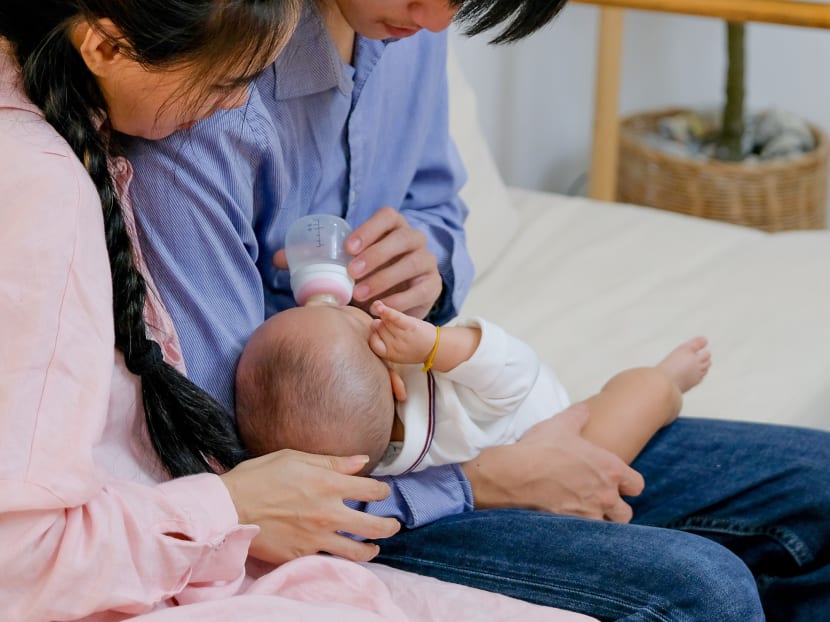WP MPs want to see more parental leave for fathers, quicker citizenship approval for Singaporeans’ foreign spouses
SINGAPORE — When Workers' Party (WP) Member of Parliament (MP) Sylvia Lim was asked by a supervisor to put on make-up for work, she brushed him off as "crazy".

- Six Workers' Party MPs spoke during a debate on the motion about women's development
- The motion was tabled on the back of a 115-page White Paper on Singapore Women's Development
- Some key issues brought up by WP MPs include anti-discrimination laws, parental leave, gender wage gap and social safety nets
SINGAPORE — When Workers' Party (WP) Member of Parliament (MP) Sylvia Lim was asked by a supervisor to put on make-up for work, she brushed him off as "crazy".
This happened when she was a law enforcement officer decades ago.
"Thinking back about it today, the comment was probably made innocently, but was it appropriate? Would such comments have an impact on other women much more deeply?" the Aljunied Group Representation Constituency (GRC) MP questioned.
Ms Lim shared this anecdote in Parliament during a debate on a motion about women's development on Tuesday (April 5).
She was one of six WP MPs to speak on the topic during the close to 10-hour-long debate.
The motion was tabled by Minister of Communications and Information Josephine Teo, after the release of a 115-page White Paper by the Government that detailed 25 action plans to be executed over the next decade.
It was endorsed and passed unanimously by all MPs in the House after more than 35 of them spoke on the topics raised.
The White Paper on Singapore Women's Development was released on March 28 and some of the recommendations made included legalising elective egg freezing for women aged 21 to 35 regardless of their marital status and normalising flexible workplace arrangements.
The following were the six main issues raised by WP during the parliamentary debate.
1. DIVORCE AND MAINTENANCE
Aljunied GRC MP Leon Perera called for changes to spousal maintenance laws in his speech, noting that during a divorce, some men are disadvantaged under Section 69 of the Women's Charter.
Section 69 of the Women's Charter states that a woman may apply to the court to order her husband to pay a monthly allowance or lump sum if the husband does not provide reasonable maintenance.
“While progress is being made to empower the majority of women in Singapore, there are whole groups of people being left behind, and these include... men who are doing exactly the same type of unpaid care work.Member of Parliament Leon Perera from the Workers' Party”
Mr Perera noted that the Government's stance during an earlier debate of the Women's Charter on Jan 10 was that gender-neutral legislation was unnecessary because "there is a higher chance of women giving up their careers to get involved in care work".
He said: "While progress is being made to empower the majority of women in Singapore, there are whole groups of people being left behind, and these include... men who are doing exactly the same type of unpaid care work."
He also suggested that husbands should be allowed to file for maintenance without the requirement for them to be incapacitated.
2. DISCRIMINATION AT WORKPLACES
Sengkang GRC MP He Ting Ru said she was "happy" to hear that anti-discrimination legislations will be introduced to penalise employers for non-compliance and give businesses clarity on exact discriminatory practices.
Noting that discrimination and discriminatory practices against women at work continue to persist despite guidance and counselling offered by the Tripartite Alliance for Fair and Progressive Employment Practices (Tafep), Ms He said that the guidance approach is "not good enough".
"While mediation is an option, there needs to be proper mechanisms for monitoring, investigation, adjudication and deterrence in place."
On this point, Mr Perera noted that victims of discrimination can have recourse to go to through the Protection from Harassment Court, for example, or file a Magistrate's complaint or pursue litigation. However, these may be deterred because the processes are costly and time-consuming.
Without legislation defining sexual harassment or employer's liability, outcomes of legal action may be uncertain, he added.
Rather than rushing into legislation, Mr Perera suggested better nudging of employers to adopt Tafep’s guidelines, such as giving them more economic incentives or "plus points" when awarding government contracts, and conducting more research to quantify the impact of following better guidelines.
He also called for the Ministry of Education to require institutes of higher learning to adhere to certain "baseline minimal standards of compliance" with regards to sexual harassment.
3. PARENTAL AND FAMILY CARE LEAVE
On the matter of parental leave, Sengkang GRC MP Louis Chua noted that there is growing evidence that fathers play an important role in children's upbringing during their formative years.
"Fathers who spend more time with their infant children develop greater confidence in their own childcare abilities, perpetuating a virtuous circle that leads to lasting egalitarian split of responsibilities between mother and father."
Mr Chua also noted that the existing elective four weeks of shared parental leave was mostly taken by mothers, with "94 to 97 per cent of fathers not taking at least one day of share parental leave for the 2014 to 2018 cohorts”.
He proposed a shared parental leave scheme that entitles parents to 24 weeks of government-paid leave to be shared between parents, with a minimum of four weeks taken by the father and 12 weeks by the mother.
This would increase parental leave from 18 weeks to 24 weeks.
Aljunied GRC MP Gerald Giam called for the legislation for family care leave, which provide caregivers with paid time off to care for their dependents.
In his suggestion, Mr Giam said that all Singaporean employees should be granted up to six days of leave to care for their young children or immediate family members with long-term illnesses or disabilities. Three would be paid for by the employer, and another three paid for by the Government,
He also proposed an extra two days granted to caregivers with more than one care recipient, paid for by the Government.
“While employees generally welcome more leave days... we can also agree that any leave enhancements will need to balance parents' caregiving needs with employers' manpower and operational needs.Ms Sun Xueling, Minister of State for Social and Family Development”
Mrs Josephine Teo, Minister for Communications and Information, said that the Government will "take time to consider" legislating parental or family care leave.
On providing leave such as infant-care and eldercare leave, Ms Sun Xueling, Minister of State for Social and Family Development, said: "While employees generally welcome more leave days... we can also agree that any leave enhancements will need to balance parents' caregiving needs with employers' manpower and operational needs."
She said that shifts in societal mindsets and norms, as well as workplace support, are needed so that couples can best decide how they care for their child.
4. GENDER PAY GAP
During his speech, Sengkang GRC MP Jamus Lim noted that married men are employed 1.3 times more than married women, yet the women earned 14 per cent less.
He repeated his call to publish aggregated and average pay gap information based on industries.
Also touching on this point, Ms He said: "While this pay gap is on the decline, it nonetheless still exists. And it is disappointing that the White Paper does not make addressing this an action item.
"Our efforts at reducing this pay gap must persist, until women in Singapore achieve equal pay to their male counterparts for equal work.”
5. FOREIGN SPOUSES OF SINGAPOREANS
Mr Perera went into depth about the immigration status of foreign spouses.
Noting that foreign spouses who are parents to Singaporean children may face insecurity from their uncertain immigration status, he highlighted that WP's 2020 manifesto had called for a "clear, transparent and time-based 'fast track' path for citizenship" for such parents.
"All the current regime does is create uncertainty for the foreign spouse and mother of Singaporean children and hence, for the family and the children," he said in Parliament.
"I would argue that non-transparency does not curb the phenomenon of Singaporeans marrying foreign spouses. It only makes things worse for everyone after the fact."
6. SINGLE PARENTS
Mr Chua said that he was "heartened" by the White Paper's action plan, which seeks to enhance support for single parents.
However, he noted that unmarried single parent households are not given benefits such as concessions from the Housing and Development Board (HDB) for accommodation needs.
They are also not eligible for the Government’s Baby Bonus Cash Gift, Cash Gift (Baby Bonus Plus), Parenthood Tax Rebate, and Working Mother's Child Relief.
"If the Working Mother's Child Relief is to encourage mothers to continue working after childbirth, the reality for many single mothers is that they simply cannot afford to not be working after childbirth," Mr Chua said.
For this group of parents, Ms Sun pointed to the Alliance for Action to Strengthen Marriages and Family, saying that it supports single parents through providing information, alternative childcare arrangements and socio-emotional support.
"The Ministry of Social and Family Development will partner with Daughters of Tomorrow to pilot a childminding service for low-income women, including single parents, outside childcare operating hours."
Ms Sun also said that following single unwed parents' public rental application, HDB will inform them of their outcomes within three weeks.
HDB will also provide an interim update for complex cases that requires more time to process.











